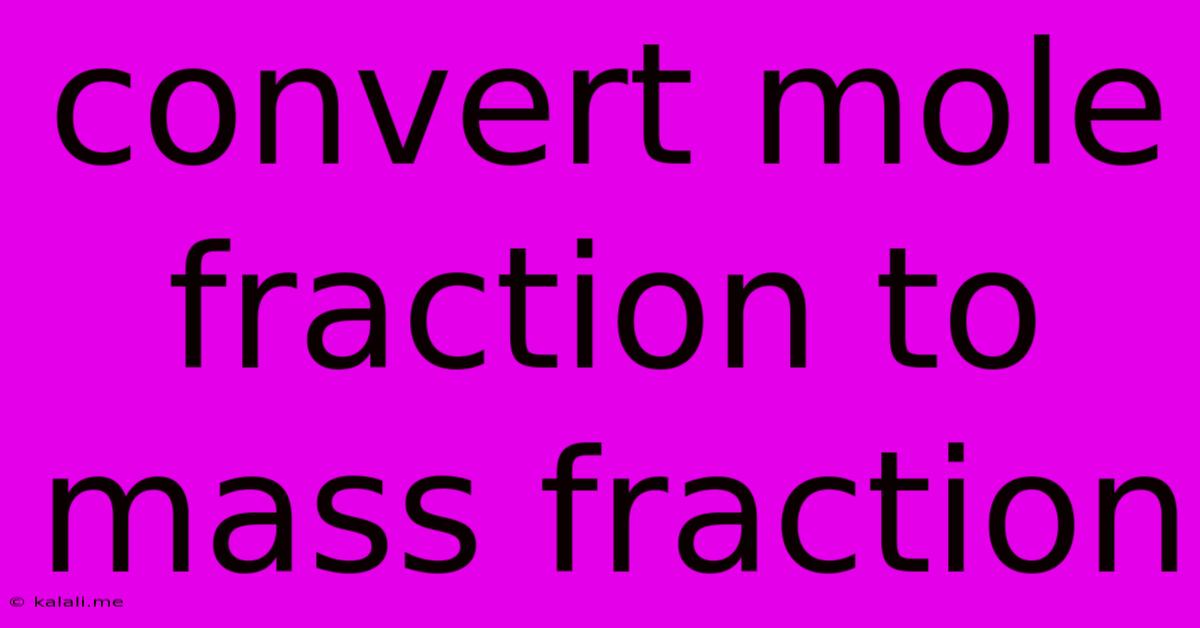Convert Mole Fraction To Mass Fraction
Kalali
Jun 15, 2025 · 3 min read

Table of Contents
Converting Mole Fraction to Mass Fraction: A Comprehensive Guide
Meta Description: Learn how to efficiently convert mole fraction to mass fraction, a crucial calculation in chemistry and materials science. This guide provides step-by-step instructions and clear examples.
Converting mole fraction to mass fraction is a common task in chemistry, chemical engineering, and materials science. Understanding this conversion is essential for accurately representing the composition of mixtures and solutions. This article will provide a clear and concise explanation of the process, complete with examples to help solidify your understanding.
Understanding Mole Fraction and Mass Fraction
Before diving into the conversion, let's define our key terms:
-
Mole fraction (x<sub>i</sub>): Represents the ratio of the number of moles of a specific component (i) to the total number of moles in the mixture. The sum of all mole fractions in a mixture always equals 1.
-
Mass fraction (w<sub>i</sub>): Represents the ratio of the mass of a specific component (i) to the total mass of the mixture. Like mole fraction, the sum of all mass fractions also equals 1.
The Conversion Formula
The conversion from mole fraction to mass fraction requires knowledge of the molar masses of the components involved. The formula is:
w<sub>i</sub> = (x<sub>i</sub> * M<sub>i</sub>) / Σ(x<sub>j</sub> * M<sub>j</sub>)
Where:
- w<sub>i</sub> is the mass fraction of component i.
- x<sub>i</sub> is the mole fraction of component i.
- M<sub>i</sub> is the molar mass of component i.
- x<sub>j</sub> is the mole fraction of component j (all components in the mixture).
- M<sub>j</sub> is the molar mass of component j (all components in the mixture).
- Σ denotes the summation over all components in the mixture.
Step-by-Step Guide with Example
Let's work through an example to illustrate the conversion process. Consider a binary mixture of ethanol (C₂H₅OH) and water (H₂O):
- Identify the components and their mole fractions:
Let's assume we have a mixture where the mole fraction of ethanol (x<sub>ethanol</sub>) is 0.40 and the mole fraction of water (x<sub>water</sub>) is 0.60 (x<sub>ethanol</sub> + x<sub>water</sub> = 1).
- Determine the molar masses:
- Molar mass of ethanol (C₂H₅OH) ≈ 46 g/mol
- Molar mass of water (H₂O) ≈ 18 g/mol
- Apply the formula:
-
w<sub>ethanol</sub> = (x<sub>ethanol</sub> * M<sub>ethanol</sub>) / (x<sub>ethanol</sub> * M<sub>ethanol</sub> + x<sub>water</sub> * M<sub>water</sub>)
-
w<sub>ethanol</sub> = (0.40 * 46 g/mol) / (0.40 * 46 g/mol + 0.60 * 18 g/mol)
-
w<sub>ethanol</sub> ≈ 0.62
-
w<sub>water</sub> = (x<sub>water</sub> * M<sub>water</sub>) / (x<sub>ethanol</sub> * M<sub>ethanol</sub> + x<sub>water</sub> * M<sub>water</sub>)
-
w<sub>water</sub> = (0.60 * 18 g/mol) / (0.40 * 46 g/mol + 0.60 * 18 g/mol)
-
w<sub>water</sub> ≈ 0.38
Therefore, the mass fraction of ethanol is approximately 0.62, and the mass fraction of water is approximately 0.38. Note that w<sub>ethanol</sub> + w<sub>water</sub> ≈ 1.
Multi-Component Mixtures
The same principle applies to mixtures with more than two components. Simply expand the summation in the denominator to include all components and their respective mole fractions and molar masses.
Conclusion
Converting mole fraction to mass fraction is a fundamental calculation in various scientific and engineering disciplines. By understanding the underlying formula and following the steps outlined above, you can confidently perform this conversion for both binary and multi-component mixtures. Remember to always double-check your calculations and ensure the sum of your mass fractions equals 1. This detailed guide provides a solid foundation for accurate compositional analysis.
Latest Posts
Latest Posts
-
What Is The Opposite Of Proud
Jun 16, 2025
-
Sum Of Odd Numbers 1 To 100
Jun 16, 2025
-
The Asthenosphere Is Part Of The
Jun 16, 2025
-
How Many Meters In A Square Mile
Jun 16, 2025
-
Organelles Which Contain Dna Include The
Jun 16, 2025
Related Post
Thank you for visiting our website which covers about Convert Mole Fraction To Mass Fraction . We hope the information provided has been useful to you. Feel free to contact us if you have any questions or need further assistance. See you next time and don't miss to bookmark.